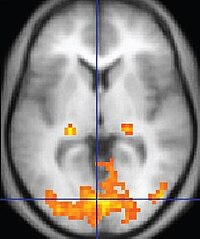
Effects of working memory on naturally occurring cravings.
Sign Up to like & getrecommendations! Published in 2019 at "Behaviour research and therapy"
DOI: 10.1016/j.brat.2019.103465
Abstract: Elaborated Intrusion (EI) theory posits a key role for visuospatial working memory (WM) in craving. In line with the predictions of EI theory, several studies have found that WM and craving show mutually interfering effects… read more here.
Keywords: occurring cravings; specifically visuospatial; working memory; naturally occurring ... See more keywords

On the relationship between mathematics and visuospatial processing in Turner syndrome.
Sign Up to like & getrecommendations! Published in 2019 at "Journal of psychiatric research"
DOI: 10.1016/j.jpsychires.2019.11.004
Abstract: A common neurocognitive phenotype of Turner syndrome (TS) includes coincident deficits in math and visuospatial reasoning while overall IQ remains intact. However, research has highlighted disparities in the relationship between these properties in women with… read more here.
Keywords: mathematics; turner syndrome; visuospatial processing; math performance ... See more keywords

The impact of age and sex on the oscillatory dynamics of visuospatial processing
Sign Up to like & getrecommendations! Published in 2019 at "NeuroImage"
DOI: 10.1016/j.neuroimage.2018.10.036
Abstract: &NA; The ability to dynamically allocate neural resources within the visual space is supported by a number of spectrally‐specific oscillatory responses, and such visuospatial processing has been found to decline moderately with age and differ… read more here.
Keywords: age; sex oscillatory; age sex; sex ... See more keywords

A comparison of local-global visuospatial processing in autism spectrum disorder, nonverbal learning disability, ADHD and typical development.
Sign Up to like & getrecommendations! Published in 2020 at "Research in developmental disabilities"
DOI: 10.1016/j.ridd.2020.103682
Abstract: BACKGROUND Research on visuospatial functioning has revealed cognitive challenges for children with autism spectrum disorder (ASD), nonverbal learning disability (NLD) and attention deficit hyperactivity disorder (ADHD). These disorders are characterized by some overlapping symptoms, making… read more here.
Keywords: processing; spectrum disorder; visuospatial processing; local global ... See more keywords

Comparison of fMRI paradigms assessing visuospatial processing: Robustness and reproducibility
Sign Up to like & getrecommendations! Published in 2017 at "PLoS ONE"
DOI: 10.1371/journal.pone.0186344
Abstract: The development of brain imaging techniques, in particular functional magnetic resonance imaging (fMRI), made it possible to non-invasively study the hemispheric lateralization of cognitive brain functions in large cohorts. Comprehensive models of hemispheric lateralization are,… read more here.
Keywords: paradigms; fmri; lateralization; visuospatial processing ... See more keywords

Longitudinal investigation of cognition, social competence, and anxiety in children and adolescents with Turner syndrome
Sign Up to like & getrecommendations! Published in 2023 at "Hormones and Behavior"
DOI: 10.2139/ssrn.4080055
Abstract: Turner syndrome (TS), a common neurogenetic disorder caused by complete or partial absence of an X chromosome in females, is characterized by distinct physical, cognitive, and social-emotional features. Girls with TS typically display average overall… read more here.
Keywords: cognition; turner syndrome; visuospatial processing; group ... See more keywords

Getting Lost Behavior in Patients with Mild Alzheimer’s Disease: A Cognitive and Anatomical Model
Sign Up to like & getrecommendations! Published in 2017 at "Frontiers in Medicine"
DOI: 10.3389/fmed.2017.00201
Abstract: Background Getting lost behavior (GLB) in the elderly is believed to involve poor top-down modulation of visuospatial processing, by impaired executive functions. However, since healthy elderly and elderly with Alzheimer’s disease (AD) experience a different… read more here.
Keywords: lost behavior; alzheimer disease; getting lost; visuospatial processing ... See more keywords